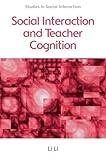Social Interaction and Teacher Cognition / Li Li.
Material type: TextSeries: Studies in Social Interaction : SSIPublisher: Edinburgh : Edinburgh University Press, [2022]Copyright date: ©2017Description: 1 online resource (232 p.)Content type:
TextSeries: Studies in Social Interaction : SSIPublisher: Edinburgh : Edinburgh University Press, [2022]Copyright date: ©2017Description: 1 online resource (232 p.)Content type: - 9780748675746
- 9780748675760
- LB2840 .L49 2017
- LB2840 .L49 2017
- online - DeGruyter
| Item type | Current library | Call number | URL | Status | Notes | Barcode | |
|---|---|---|---|---|---|---|---|
 eBook
eBook
|
Biblioteca "Angelicum" Pont. Univ. S.Tommaso d'Aquino Nuvola online | online - DeGruyter (Browse shelf(Opens below)) | Online access | Not for loan (Accesso limitato) | Accesso per gli utenti autorizzati / Access for authorized users | (dgr)9780748675760 |
Browsing Biblioteca "Angelicum" Pont. Univ. S.Tommaso d'Aquino shelves, Shelving location: Nuvola online Close shelf browser (Hides shelf browser)

|

|

|

|

|

|

|
||
| online - DeGruyter Textual Deceptions : False Memoirs and Literary Hoaxes in the Contemporary Era / | online - DeGruyter Designs on the Past : How Hollywood Created the Ancient World / | online - DeGruyter The Edinburgh Companion to Samuel Beckett and the Arts / | online - DeGruyter Social Interaction and Teacher Cognition / | online - DeGruyter State Ideology and Language in Tanzania : Second and revised edition / | online - DeGruyter The Morality of Peacekeeping / | online - DeGruyter Bilingualism as Interactional Practices / |
Frontmatter -- CONTENTS -- LIST OF ABBREVIATIONS -- ACKNOWLEDGEMENTS -- INTRODUCTION -- PART A: SURVEY -- 1 LANGUAGE TEACHER COGNITION: AN OVERVIEW -- 2 APPROACHES TO THE STUDY OF TEACHER COGNITION -- 3 TEACHER COGNITION AND INTERACTION -- PART B: ANALYSIS -- 4 LEARNING TO TEACH AND PRE-SERVICE TEACHER COGNITION -- 5 DEVELOPING EXPERTISE AND IN-SERVICE TEACHER COGNITION -- 6 INTERACTIVE DECISION-MAKING AND TEACHER COGNITION -- PART C: APPLICATIONS -- 7 UNDERSTANDING PEDAGOGY -- 8 LANGUAGE TEACHER EDUCATION -- APPENDIX: TRANSCRIPTION CONVENTIONS -- REFERENCES -- INDEX
restricted access online access with authorization star
http://purl.org/coar/access_right/c_16ec
Investigates language teachers’ thoughts, beliefs and knowledge through the lens of social interactionIn the past decade there has been a surge of interest in the study of language teacher cognition – what language teachers know, think and believe – and of its relationship to teachers’ classroom practices. Social Interaction and Teacher Cognition is the first book to use a discursive psychological perspective to examine teacher cognitions. Informed by conversation analysis (CA), the book offers a close examination of cognition-in-interaction in three distinctive aspects: learning to teach, novice and expert teachers’ cognition, and interactive decision making. The book views cognition as a socially constructed and contextual process, and treats interaction as a framework that deals with psychological matters in a public and visible way. It will be of particular relevance to those researching teacher cognition in EFL contexts and will appeal to anyone interested in the study of classroom interaction.Features a three part structure of survey, analysis and application Takes a discursive psychological approach to teacher cognitions Uses conversation analysis to examine cognition-in-interaction Provides detailed examples of language in interaction in EFL contexts
Mode of access: Internet via World Wide Web.
In English.
Description based on online resource; title from PDF title page (publisher's Web site, viewed 29. Jun 2022)


